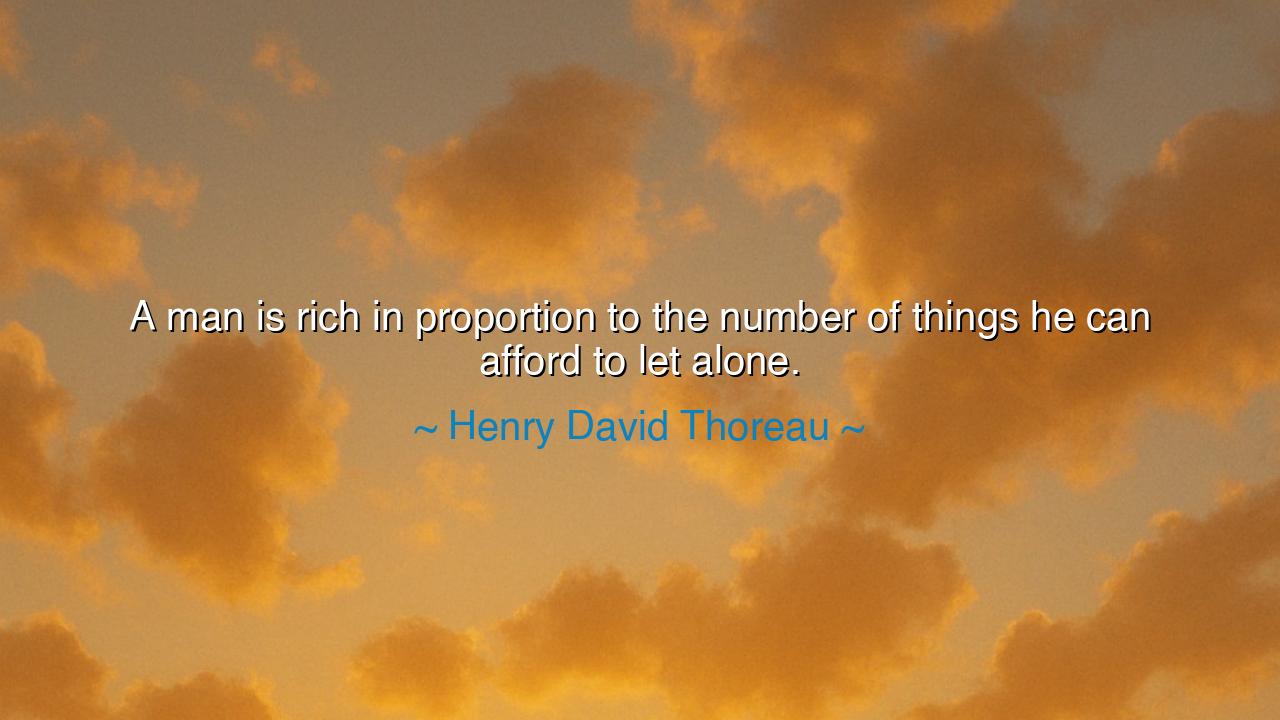
A man is rich in proportion to the number of things he can afford






When Henry David Thoreau wrote, “A man is rich in proportion to the number of things he can afford to let alone,” he was not speaking of coins or possessions, but of freedom — the inner wealth of a soul unchained from desire. These words, found in his immortal work Walden, were born of solitude and reflection beside a quiet pond in the forests of Concord. There, Thoreau sought not riches, but simplicity. He saw the fever of his age — men chasing wealth, reputation, and comfort — and he understood that the more they grasped, the poorer they became. For to cling to too many things is to be enslaved by them, but to let go is to stand sovereign in one’s own spirit.
Thoreau’s life itself was the proving ground for this philosophy. He withdrew from society not to escape it, but to see it clearly. In a small cabin of his own making, with little more than a table, a chair, and his books, he discovered the abundance of having enough. While others toiled endlessly to possess the world, Thoreau realized that the richest man is he who possesses his peace. “Superfluous wealth,” he wrote, “can buy only superfluities.” He had found what many never do — that true wealth lies not in ownership, but in the mastery of need. Every unnecessary desire he renounced became a coin in the treasury of his soul.
The ancients, too, knew this truth. The Stoic philosopher Epictetus, once a slave, taught that no man is poor who governs his desires. The rich man, he said, is not the one who has much, but the one who wants little. And so Thoreau’s wisdom is the echo of an eternal law — that abundance without restraint breeds emptiness, but restraint itself brings fulfillment. The man who can walk past luxury and feel no hunger for it, the one who can see beauty in simplicity, possesses a kingdom within. His heart is unburdened, his mind clear, his spirit at ease.
Consider the example of Mahatma Gandhi, who centuries after Thoreau would live by the same creed. Gandhi owned almost nothing — a pair of sandals, a spinning wheel, a few simple garments — yet he moved nations. When asked about his poverty, he smiled and said, “I have no need for riches. My wealth is in my peace.” His simplicity was not weakness, but strength. It gave him clarity, power, and unshakable resolve. Like Thoreau, Gandhi understood that when a man can let go of everything, he becomes master of himself — and no one, not even an empire, can conquer him.
In every age, humanity is tempted by accumulation — of possessions, of power, of praise. We gather endlessly, believing that more will make us whole. But each new desire tightens the net around the heart. The modern man is surrounded by abundance, yet he starves for peace. Thoreau’s words cut through this illusion: to be rich is not to have more, but to need less. Every unnecessary thing you can let alone — every envy resisted, every craving silenced — adds to your inner fortune. The man who can walk lightly, who owns his desires rather than being owned by them, is the wealthiest of all.
There is deep heroism in this simplicity. It takes courage to step away from the endless chase, to say, “I have enough.” It takes strength to value quiet over noise, restraint over indulgence, contentment over conquest. Thoreau’s teaching is not a rejection of the world, but a transformation of how we live in it. To “let alone” does not mean to withdraw from life, but to walk through it unentangled — to love without clinging, to act without greed, to live without vanity.
So, my children, take this as your counsel: simplify your life, for in simplicity you will find power. Learn to let go — not in bitterness, but in wisdom. Do not measure your worth by what you hold, but by what you can release without sorrow. When you feel the pull of endless wanting, pause and ask yourself: Is this a need of the soul, or a hunger of the ego? The former will free you; the latter will chain you. The less you cling to, the more the world opens before you — wide, quiet, and full of wonder.
And remember Thoreau’s eternal truth: “A man is rich in proportion to the number of things he can afford to let alone.” The man who owns little but walks in peace is wealthier than kings. For gold can be stolen, and fame forgotten, but the one who masters his desires walks forever in abundance. This, then, is the richest life: not the one overflowing with possessions, but the one content in its stillness, radiant in its freedom, and full — gloriously full — of nothing but itself.






AAdministratorAdministrator
Welcome, honored guests. Please leave a comment, we will respond soon